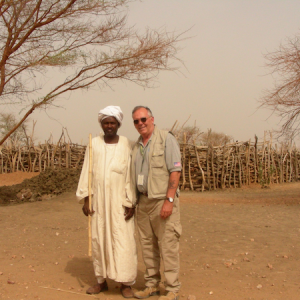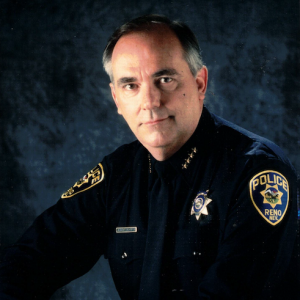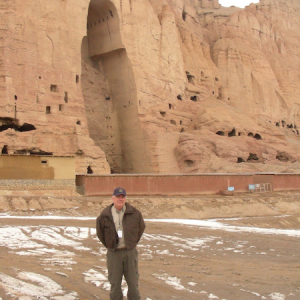Anthropology MA, Biological concentration (Forensic Anthropology) 1988
If you were asked to name least likely professions to pursue with an anthropology education, police work might make your list. Jerry Hoover, retired Chief of Police at the Reno Police Department in Nevada, would like to have a word about that.
Hoover began his journey in anthropology as a young police officer in San Diego, attaining his BA in Anthropology at San Diego State University in 1977. A new job as a police lieutenant led him to Boulder where he returned to school initially to study geography and natural disasters at University of Colorado. There, Hoover met Dr. Michael Charney, who ran the forensic anthropology laboratory at CSU and had been the acting coroner during the Big Thompson flood of 1976. Hoover became fascinated with the field and Charney and his work, and transferred to CSU’s anthropology program. After graduating from CSU with his Anthropology MA, Hoover was offered a fellowship to study at Harvard University Kennedy School of Government, where he earned a Master in Public Administration degree with a concentration in international security.

Hoover went on to become the Chief of Police at the Reno Police Department, in Nevada. After retiring in 2004, he began a second career in international policing. He was the interim police commissioner for the United Nations Police in Sudan, then became a senior police advisor for the U.S. Department of State in Iraq, and a police contractor running the training program for police in Afghanistan for the Department of State. He has also consulted for the Government of Nepal and the Royal New Zealand Police Academy.
Hoover’s last career came as a college professor teaching criminal justice and anthropology courses at Feather River College in California and the University of Nevada, Reno and Las Vegas campuses, before finally retiring in 2021.
Among his many experiences, Hoover recalled his time as a member of the United Nations staff that worked to help create the new nation of South Sudan as the most rewarding. Hoover took the job in Sudan because he wanted to work in the same area that many early anthropologists studied, in particular E.E. Evans-Pritchard. Although not researching the Sudanese people, Hoover worked to help provide education for children, particularly setting up schools for girls, which was a crucial task for U.N. personnel in Sudan where the female illiteracy rate was near zero at the time.
To me anthropology is not a discipline, it is a way of thinking and a way of living. I have always considered myself an anthropologist first, and then whatever career I was engaging in second.
What knowledge and skills from your degree have served you best throughout your careers?
Although I considered myself a biological — what we called physical– anthropologist, I used the knowledge and training from cultural anthropology the most. Whether I was a domestic police officer or an international contractor, my knowledge of culture helped me understand the people I was interacting with as well as helping me analyze the groups so that I could assist them in their problem-solving efforts. I looked at each foreign assignment as a mini ethnography.
While I am retired, I still train police officers throughout the nation. I am always able to draw from my anthropological background to train officers in some of the more controversial topics such as intercultural relations and diversity.
Is there a specific mentor or experience that were particularly influential?
My early work with Dr. Charney helped formulate my approach to using anthropology in police work. When I first decided to study anthropology at San Diego State University, one of my commanding officers at the San Diego Police Department told me that he didn’t understand what “picking up rocks” had to do with police work. My response was, “I don’t know what picking up rocks had to do with anthropology!” People in policing just didn’t understand what anthropology was. Interesting, because many of them had degrees in sociology. Dr. Charney, who had experience with law enforcement in the 1930s — many people did not know that — helped me cross the bridge between the two professions.
Once, when I was giving a talk to the American Anthropological Association in San Francisco, I was introduced to the audience by the host as a police chief with a degree in anthropology. I corrected him, with a smile, and said, ‘I would rather be considered an anthropologist with a gun.’ The audience laughed with me.

Is there a story from your career you would like to share with other alumni and current CSU students?
Once, when I was giving a talk to the American Anthropological Association in San Francisco, I was introduced to the audience by the host as a police chief with a degree in anthropology. I corrected him, with a smile, and said, “I would rather be considered an anthropologist with a gun.” The audience laughed with me.
I have had many leadership roles in law enforcement and academics. My leadership method is highly influenced by my anthropological training. You see, to me anthropology is not a discipline, it is a way of thinking and a way of living. I have always considered myself an anthropologist first, and then whatever career I was engaging in second.
What are you most proud of since graduating from CSU?
There are two post academy training models for police officers in the United States. One was created at the San Jose Police Department 50 years ago and is still used today. The other was created at the Reno Police Department by a team that I created and led 20 years ago. I was given a grant by the U.S. Department of Justice to create the program, which is called the Police Training Officer Program (PTO). As I guided the team, I tried to incorporate as many ideas from anthropology as I could. My thought was, we were bringing young people into the police subculture and reforming their thinking, ethics, and beliefs to be one of us. That is a heavy responsibility, and often fails. I didn’t believe that we should mold these new officers in our image, but to give them the opportunity to learn and explore their new environment. The PTO Program was able to do that.
What keeps you busy these days?
I explore the desert. I live in Las Vegas and enjoy going to ghost towns in the southwest or just exploring the back trails in my Jeep. I volunteer to be a site steward for the Nevada State Historic Preservation Office. I have a particular rock art site that I visit at least twice a year and record any changes or damage to the site.

Any advice for current students?
1) Have an imagination. When Astronaut Frank Borman was testifying before Congress on the Apollo 1 disaster, he was asked what he thought was the main reason for the fire and deaths of three astronauts. He said, “It was a lack of imagination.” We always thought we’d lose men in space, but no one considered that we would lose them during a test on the ground. I have used my imagination as much as possible in every project I have worked in my career, with much success.
2) Take every opportunity to lead. Leadership is the ability to influence people to solve their own problems in a proper manner. It does not mean command or authority. Anyone can be a leader. Take every opportunity to lead and it will provide you with many successes in your career.
3) Take risks. People who don’t take risks tend to fail. I was offered a Presidential appointment to be the U.S. Marshal for the District of Nevada. While I was waiting for Congressional approval, I was offered the position in Sudan by the United Nations. It was very risky to take a position in a war-torn country with little support and no real knowledge of how to do that job. I accepted the U.N. position, which led to several other challenges and opportunities.